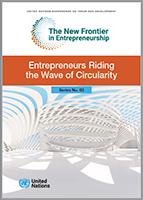
The world is changing and so are business models. As the planet faces major challenges of climate change and biodiversity loss, as well as rising energy costs, the number of entrepreneurs adopting the circular economy as a business model is increasing. The transition from a linear, take-make-waste model towards a regenerative, circular one is taking place as today's global production and consumption model is becoming more and more unsustainable.
Entrepreneurs play a catalytic role in driving the transformation towards circularity. As agents of innovation, they introduce new products, services, methods of production and business models by identifying opportunities that respond to emerging needs. Through their willingness to take risks, entrepreneurs embrace uncertainties and invest efforts, time and resources in creating innovative solutions capable of disrupting markets, paving the way for new attitudes and business practices across industries.
This publication identifies key opportunities and challenges in the transition to a circular economy and showcases inspiring examples of entrepreneurs managing small and medium-sized enterprises (SMEs) and tech start-ups that are advancing this new economic model in local communities. It also highlights policy initiatives to support entrepreneurial innovations and aims to encourage more business-led initiatives for a circular economy with a special focus on developing countries.
Key takeaways
The circular economy is a growing economic model that not only tackles pressing environmental challenges but also has the potential to unlock economic growth and job creation, and contribute to building resilient and sustainable societies.
Entrepreneurs are catalysers of the circular economy, acting as agents of change through experimentation and creativity. Armed with innovative solutions tailored to local challenges, entrepreneurs driving SMEs and start-ups have the power to bring about mindset changes within their communities and send ripples of change throughout the entire value chain.
Despite the vast array of economic and social opportunities that the circular economy offers, its implementation encounters challenges that hold back entrepreneurial innovation, especially in developing countries.
To develop the circular economy and help SMEs and start-ups scale in this new model, the following considerations are important:
-
Multi-stakeholder collaboration is key. A collaborative approach of public- and private-sector players on ways forward is needed to effectively transition to the circular economy. Bottlenecks, challenges and opportunities need to be identified per industry, along with associated policy tools such as regulations, standards and schemes to encourage entrepreneurs to innovate and adapt their business models.
This collaboration is also essential to ensure coherence and complementarity across policies. Regulatory bodies are often well positioned to appoint a facilitator who can lead the process in a collaborative manner.
-
Capital needs to be mobilized to scale the circular economy. To de-risk investments and stimulate circular innovation and entrepreneurship, there is a need for public support. Increased public and private investment in these areas can be mutually beneficial, enabling the alignment with ESG goals while seizing opportunities for sustainable growth.
Public institutions play an important role in driving this shift. They can spearhead change by directly investing in key economic sectors, facilitating special loans at favourable rates, offering grants,
supporting R&D initiatives, and aligning taxes and subsidies to promote circular initiatives.
- Embracing the circular economy requires a mindset change. Boosting innovation and entrepreneurship in the circular economy requires significant education and awareness-raising efforts to facilitate the uptake of circular practices. A mindset shift towards circularity can be promoted by empowering entrepreneurial initiatives through targeted incentives and support mechanisms.
Initiatives such as knowledge exchange platforms to increase information and capacity-building for SMEs and start-ups, as well as incubators and accelerators focused on the circular economy, can provide the necessary resources to entrepreneurs to advance circular innovations.


